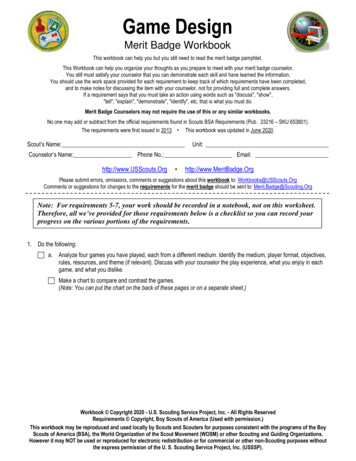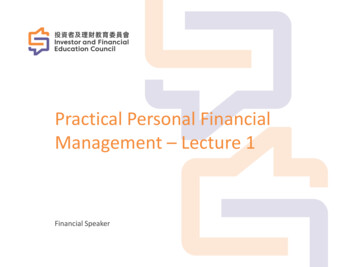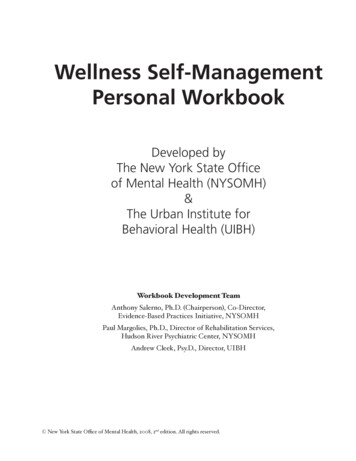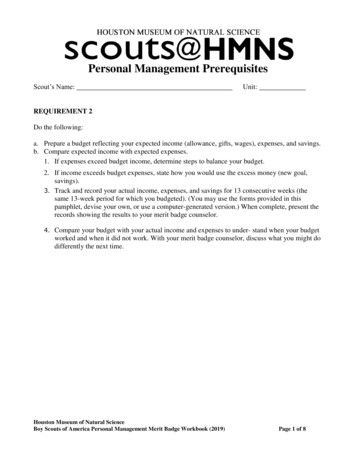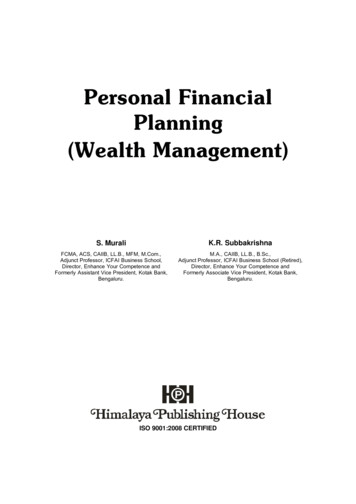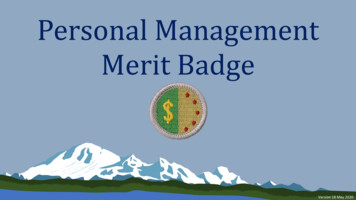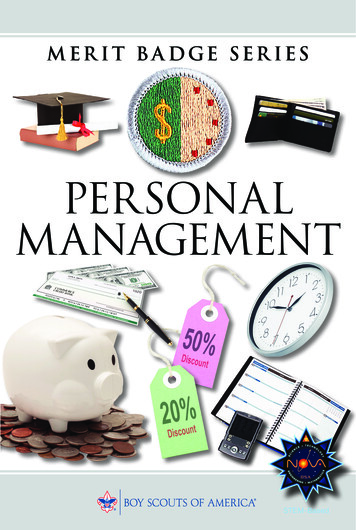
Transcription
PERSONALMANAGEMENTSTEM-Based
BOY SCOUTS OF AMERICAMERIT BADGE SERIESPERSONALMANAGEMENT“Enhancing our youths’ competitive edge through merit badges”
Personal Management1. Do the following:(a) Choose an item that your family might want to purchase that is considereda major expense.(b) Write a plan that tells how your family would save money for the purchaseidentified in requirement 1a.(1) Discuss the plan with your merit badge counselor.(2) Discuss the plan with your family.(3) Discuss how other family needs must be considered in this plan.(c) Develop a written shopping strategy for the purchase identified inrequirement 1a.(1) Determine the quality of the item or service (using consumerpublications or ratings systems).(2) Comparison shop for the item. Find out where you can buy the itemfor the best price. (Provide prices from at least two different price sources.)Call around; study ads. Look for a sale or discount coupon. Consideralternatives. Can you buy the item used? Should you wait for a sale?2. Do the following:(a) Prepare a budget reflecting your expected income (allowance, gifts, wages),expenses, and savings for a period of 13 consecutive weeks.(b) Compare expected income with expected expenses.(1) If expenses exceed budget income, determine steps to balanceyour budget.(2) If income exceeds budget expenses, state how you would use theexcess money (new goal, savings).(c) Track and record your actual income, expenses, and savings for 13consecutive weeks (the same 13-week period for which you budgeted).(You may use the forms provided in this pamphlet, devise your own, oruse a computer-generated version.) When complete, present the recordsshowing the results to your merit badge counselor.(d) Compare your budget with your actual income and expenses to understand when your budget worked and when it did not work. With yourmerit badge counselor, discuss what you might do differently the next time.3. Discuss with your merit badge counselor FIVE of the following concepts:(a) The emotions you feel when you receive money.(b) Your understanding of how the amount of money you have with youaffects your spending habits.177
(c) Your thoughts when you buy something new and your thoughts about thesame item three months later. Explain the concept of buyer’s remorse.(d) How hunger affects you when shopping for food items (snacks, groceries).(e) Your experience of an item you have purchased after seeing or hearingadvertisements for it. Did the item work as well as advertised?(f) Your understanding of what happens when you put money into asavings account.(g) Charitable giving. Explain its purpose and your thoughts about it.(h) What you can do to better manage your money.4. Explain the following to your merit badge counselor:(a) The differences between saving and investing, including reasons for usingone over the other.(b) The concepts of return on investment and risk and how they are related.(c) The concepts of simple interest and compound interest.(d) The concept of diversification in investing.(e) Why it is important to save and invest for retirement.5. Explain to your merit badge counselor what the following investments are andhow each works:(a) Common stocks(b) Mutual funds(c) Life insurance(d) A certificate of deposit (CD)(e) A savings account(f) A U.S. savings bond6. Explain to your counselor why people might purchase the following types ofinsurance and how they work:(a) Automobile(b) Health(c) Homeowner’s/renter’s(d) Whole life and term life7. Explain to your merit badge counselor the following:(a) What a loan is, what interest is, and how the annual percentage rate(APR) measures the true cost of a loan.(b) The different ways to borrow money.(c) The differences between a charge card, debit card, and credit card. Whatare the costs and pitfalls of using these financial tools? Explain why it isunwise to make only the minimum payment on your credit card.*Always be sure to have proper permission before using the internet. To learn about appropriate behavior and etiquettewhile online, consider earning the BSA Cyber Chip. Go to hip/ formore information.178
(d) Credit reports and how personal responsibility can affect your credit report.(e) Ways to reduce or eliminate debt.8. Demonstrate to your merit badge counselor your understanding of timemanagement by doing the following:(a) Write a “to do” list of tasks or activities, such as homework assignments,chores, and personal projects, that must be done in the coming week. Listthese in order of importance to you.(b) Make a seven-day calendar or schedule. Put in your set activities, such asschool classes, sports practices or games, jobs or chores, and/or Scout orplace of worship or club meetings, then plan when you will do all the tasksfrom your “to do” list between your set activities.(c) Follow the one-week schedule you planned. Keep a daily diary or journalduring each of the seven days of this week’s activities, writing down whenyou completed each of the tasks on your “to do” list compared to when youscheduled them.(d) With your merit badge counselor, review your “to do” list, one-weekschedule, and diary/journal to understand when your schedule worked andwhen it did not work. Discuss what you might do differently the next time.9. Prepare a written project plan demonstrating the steps below, including thedesired outcome. This is a project on paper, not a real-life project. Examplescould include planning a camping trip, developing a community serviceproject or a school or religious event, or creating an annual patrol plan withadditional activities not already included in the troop annual plan. Discussyour completed project plan with your merit badge counselor.(a) Define the project. What is your goal?(b) Develop a timeline for your project that shows the steps you must takefrom beginning to completion.(c) Describe your project.(d) Develop a list of resources. Identify how these resources will help youachieve your goal.(e) Develop a budget for your project.10. Do the following:(a) Choose a career you might want to enter after high school orcollege graduation. Discuss with your counselor the needed qualifications,education, skills, and experience.(b) Explain to your counselor what the associated costs might be to pursuethis career, such as tuition, school or training supplies, and room and board.Explain how you could prepare for these costs and how you might make upfor any shortfall.179
Personal Management Resources.Personal ManagementResourcesScouting LiteratureBoy Scout Journal; American Business,American Labor, Entrepreneurship,Family Life, Inventing, Salesmanship,and Scholarship merit badge pamphlets;also see merit badge pamphlets onparticular careers or vocations.Visit the Boy Scouts of America’sofficial retail website at http://www.scoutstuff.org for a completelisting of all merit badge pamphletsand other helpful Scouting materials and supplies.Discovering Yourself, Defining YourFuture. Ten Speed Press, 2006.Covey, Sean. The 7 Habits ofHighly Effective Teens. Simon& Schuster, 1998.Gardner, David, Tom Gardner, andSelena Maranjian. The MotleyFool Investment Guide for Teens.Fireside, 2002.Morgenstern, Julie and JessiMorgenstern-Colon. OrganizingFrom the Inside Out for Teenagers.Owl Books, 2002.Bamford, Janet. Street Wise: A Guidefor Teen Investors. BloombergPress, 2000.Morris, Kenneth M. and Virginia B.Morris. The Wall Street JournalGuide to Understanding PersonalFinance, 3rd ed. Simon andSchuster, 2000.Bateman, Katherine R. The YoungInvestor: Projects and Activitiesfor Making Your Money Grow.Chicago Press Review, 2001.National Association of InvestorsCorporation (NAIC). InvestingIn Your Future. South-WesternEducational Publishing, 2001.Bodnar, Janet. Kiplinger’s Money-SmartKids. Kiplinger Books, 1999.Pervola, Cindy, and Debby Hobgood.How to Get a Job If You’re aTeenager, 2nd ed. HighsmithPress, 2000.BooksBolles, Richard Nelson, Carol Christen,and Jean M. Blomquist. WhatColor Is Your Parachute? For Teens:62PERSONAL MANAGEMENT
.Personal Management ResourcesOrganizations and WebsitesAffordable Colleges FoundationWebsite: id/financial-aid-for-online-collegesBureau of Labor StatisticsU.S. Department of LaborWebsite: http://www.bls.govCenter for Student Credit CardEducation Inc.Telephone: 650-347-3327Website: http://www.cscce.comConsumer FinancialProtection BureauWebsite: http://www.consumerfinance.govFederal Student AidWebsite: http://www.studentaid.govFederal Trade CommissionConsumer InformationWebsite: http://www.consumer.ftc.gov/Independent Living ResourcesWebsite: http://www.ilrinc.comThe Motley FoolWebsite: http://www.fool.com/familyfool/welcome.htmNational Association ofInvestors CorporationToll-free telephone: gThe SmartStudent Guideto Financial AidTelephone: 724-538-4500Website: http://www.finaid.orgStudents.govWebsite: http://www.students.govU.S. Department of Education’sFederal Student Aid on the WebTelephone: 319-337-5665Toll-free telephone: 800-433-3243Website: http://studentaid.ed.govYoungBiz.comWebsite: http://www.youngbiz.comAcknowledgementsThe Boy Scouts of America extendsthanks to Eagle Scout Brent A. Neiser,CFP, senior director of Strategic Programand Alliances at the Denver-basedNational Endowment for FinancialEducation (NEFE ). Mr. Neiser wrotethe 1996 edition of the PersonalManagement merit badge pamphletupon which this edition is based. Hewas instrumental in this revision.NEFE inspires empowered financialdecision making for individuals andfamilies through every stage of life.NEFE is a private, nonprofit, nonpartisan, and noncommercial foundation.The NEFE website has many toolsfor planning your college education andfuture. Visit www.nefe.org.National Endowment forFinancial Education Telephone: 303-741-6333Websites: L MANAGEMENT63
8. Demonstrate to your merit badge counselor your understanding of time management by doing the following: (a) Write a “to do” list of tasks or activities, such as homework assignments, chores, and personal projects, that must be done in the coming week. List these in order of impo

